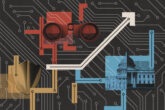August 15, 2025
America Should Rent, Not Sell, AI Chips to China
This article was originally published on RAND.
President Trump announced Monday that Nvidia will pay the U.S. government 15 percent of the revenue it derives from sales of its H20 chip to China—an unusual arrangement that gives up leverage. The United States could do better: Rather than selling AI chips, the United States should instead rent them to China to permanently maintain its AI chip edge.
Controversy surrounding NVIDIA's China-specific H20 AI chip has reignited debate over chip exports to China. Proponents of H20 exports argue that sales keep China dependent on U.S. technology while generating revenue. They claim denying access would only accelerate China's drive for homegrown alternatives. These arguments miss a superior alternative to selling chips that would yield similar benefits to the United States: providing China with the computing power it seeks for a fee via remote cloud access
Selling AI chips to China outright reduces America's AI lead for little benefit.
When the United States sells chips, they're gone forever—disappearing into data centers with unknown users pursuing unknown goals. There's another option: give users the computing power of chips remotely. Cloud services offer almost everything chip sales promise, plus actual control: access can be shut off at any stage (PDF) as geopolitical conditions change or threats arise. The economics are better too. AI chips are sold to U.S. cloud providers, who generate additional revenue by renting AI chips to China—creating two revenue streams instead of one. Companies like Amazon and Microsoft already serve global customers this way, maintaining physical possession of the chips while providing computational power on demand.
Unlike physical chip exports, cloud access makes it significantly harder for customers to redirect access to unauthorized parties. Know-your-customer requirements enable monitoring for connections to Chinese military entities. Cloud access also creates continuous leverage—every renewal becomes a negotiation opportunity, compared to chips that get replaced only every three to four years.
Read the full article on RAND.
More from CNAS
-
Technology & National Security
CNAS Insights | Unpacking the H200 Export PolicyAI Chips for China With two new policies, President Donald Trump has implemented his pledge to allow sales of NVIDIA’s H200 AI chips to China in exchange for a quarter of the ...
By Janet Egan & James Sanders
-
Technology & National Security
CNAS Insights | The Export Control Loophole Fueling China's Chip ProductionThis week, Reuters reported that China has apparently built a prototype of an extreme ultraviolet lithography (EUV) system, a highly intricate machine used to produce cutting-...
By Michelle Nie, Autumn Dorsey & Janet Egan
-
Energy, Economics & Security / Technology & National Security
Recommendations for Promoting American AI AbroadStrategic Context and Program Objectives The American AI Exports Program is an ambitious and essential proposal to expand the reach of American AI technologies in foreign mar...
By Janet Egan, Geoffrey Gertz, Daniel Remler & Ruby Scanlon
-
Technology & National Security
Prepared, Not ParalyzedExecutive Summary The Trump administration has embraced a pro-innovation approach to artificial intelligence (AI) policy. Its AI Action Plan, released July 2025, underscores t...
By Janet Egan, Spencer Michaels & Caleb Withers




